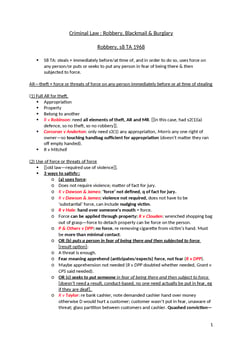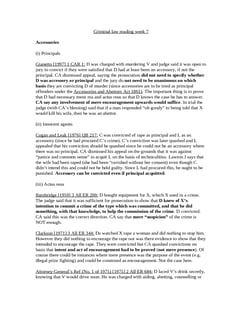R v Gomez [1993] AC 442; [1992] 3 WLR 1067; [1993] 1 All ER 1
Judgement for the case R v Gomez
Table Of Contents
KEY POINTS
Crimes involving theft by shop employees through deceitful appropriation and the use of stolen cheques are addressed by the Theft Act 1968 (c. 60), particularly in sections 1(1) and 3(1).
-
This legislation targets individuals who dishonestly take goods without authorization, with an added focus on the knowing use of stolen cheques.
The Act establishes legal boundaries and consequences for such deceptive practices, emphasizing the importance of intent in determining criminal liability.
It provides a framework to address and penalize the exploitation of positions of authority for personal gain in the retail sector.
FACTS
-
Gomez ("Defendant"), an assistant manager at a shop, faced charges of theft under section 1(1) of the Theft Act 1968.
A customer approached the Defendant to obtain goods in exchange for two stolen cheques.
Despite being aware of the cheque's stolen nature, Defendant deceived the shop manager to authorize the sale.
-
During the trial, the Defendant argued that there was no case to answer, contending that the goods were sold under a valid contract between the customer and the shop, and no appropriation of property belonging to another occurred.
However, the judge rejected this submission, ruling that the Defendant's actions constituted theft.
Faced with the court's decision, the Defendant pleaded guilty and was subsequently convicted.
The Court of Appeal (Criminal Division) later allowed his appeal against conviction, indicating a reconsideration of the case and raising questions about the legal interpretation of appropriation in this context.
JUDGEMENT
-
In the appellate proceedings initiated by the Crown, the court rendered its judgment with due consideration and thorough examination of the pertinent legal principles.
This decision, apart from the dissenting opinion voiced by Lord Lowry, showed legal interpretation pertaining to the Theft Act 1968.
-
The central issue at hand revolved around the contention that an act, whether expressly or implicitly authorized by the owner of goods or carried out with their consent, could be deemed an appropriation of said goods under the provisions of section 1(1) of the legislation.
Importantly, this interpretation hinged on the circumstance where the purported authorization or consent had been acquired through deceptive means.
-
Upon scrutiny of the legal nuances and precedents, the court, in a majority decision, aligned with the stance that an appropriation, as defined within the ambit of section 1(1) of the Theft Act 1968, was not exempt from the elements of deception leading to the procurement of consent or authorization from the owner of the goods.
This nuanced perspective was important in establishing the legal grounds upon which the defendant in question had been convicted of theft.
In essence, the court upheld the notion that, even when seemingly sanctioned by the owner, an act could be considered as constituting theft if the authorization or consent was tainted by deception.
COMMENTARY
The case discusses theft by shop employees under the Theft Act 1968, emphasizing its focus on dishonest appropriation and the use of stolen cheques. It highlights the Act's role in establishing legal boundaries and consequences, particularly addressing the exploitation of authority in the retail sector.
-
The case involving Gomez, an assistant manager, unfolds with charges for exchanging goods for stolen cheques obtained through deception.
Despite a trial argument that a valid contract existed, the guilty plea and conviction ensued.
The Court of Appeal's intervention raised questions about legal interpretation, leading to an overturned conviction.
In the Crown's appeal, it was held that an act authorized or consented to by the owner could constitute appropriation under section 1(1) of the Theft Act if deception were involved.
The conclusion affirms the Defendant's rightful conviction, illustrating the nuanced application of the law in cases involving deceitful practices.
For Further Study on R v Gomez
Need instant answers? Our AI exam tutor is here to help.
Ask questions 🙋 Get answers 📔 It's simple 👁️👄👁️
Our AI is educated by the highest scoring students across all subjects and schools. Join hundreds of your peers today.
Get StartedSimilar Cases
Related Product Samples
These product samples contain the same concepts we cover in this case.
| GDL Criminal Law | Theft Notes (7 pages) |
| Criminal Law | Theft Notes (21 pages) |
| GDL Criminal Law | Theft Related Offences Notes (11 pages) |


